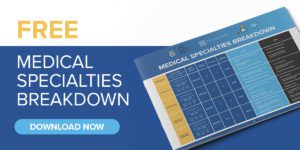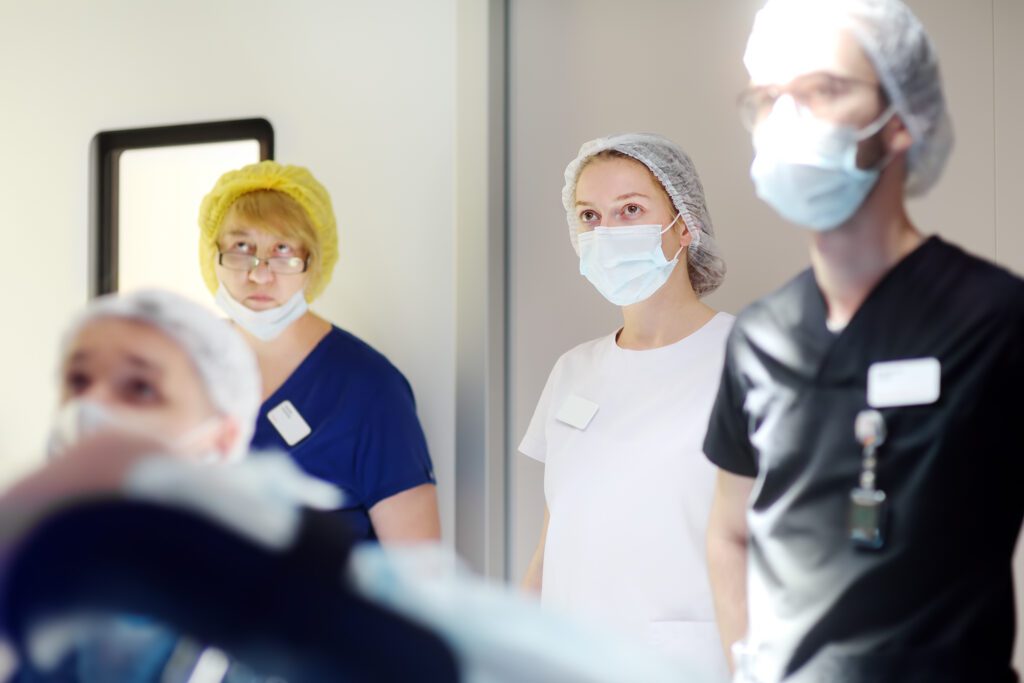Why I Chose OB/GYN as a Specialty: My Story
- by
- Sep 19, 2023
- Reviewed by: Amy Rontal, MD

Every year around September, fourth-year medical students confidently state, “I’m applying into [insert specialty]!” when conversing with their attendings, fellow students, and anyone they pass on the street.
While it certainly feels good to get to this point of assuredness, the twists and turns and (occasionally) crushing weight of making this decision are often glossed over.
If you are struggling with wondering how you should go about choosing a specialty, take heart. My story of choosing to apply into obstetrics and gynecology (OB/GYN) will show how, although the journey feels uncertain, with time and reflection you can ultimately make an informed decision you will be proud of.
Here’s my story.
My Journey to Choosing OB/GYN as a Specialty
While I entered medical school set on going into family medicine, during my third year, I decided to jump ship and pursue a career in OB/GYN.
For months, I agonized over this decision (and I’m not using this word lightly) and felt like there was no way I could ever come to a conclusion. However, looking back, it seems like the obvious choice.
Early Signs that OB/GYN Was My Calling
Growing up, I was the weird kid who loved sex ed class. I competed in sports throughout childhood and college and loved developing a skill set over time with my teammates, similar to the teamwork required of medical professionals. I also prioritized building empathy and compassion through lifelong personal relationships, making sure that my friends always felt comfortable confiding in me through their highest highs and lowest lows.
As I got older, I was infuriated by the prevalence of sexual violence, maternal mortality, and traumatic healthcare experiences. I felt inspired by those who saw a better way to care for women.
Gaining Clinical Experience
Despite my interests and experiences, it wasn’t until my third year that I realized how fulfilling working as an OB/GYN could be. It was this slow process of saying, “Huh, it’s amazing some people get to do that as their job.”
I found myself thinking things like,
“Wow, walking someone through their first pelvic exam can have a profound impact on how they engage with the healthcare system in the future.”
“It’s empowering to see a patient with ovarian torsion and know you can help alleviate their suffering through surgery.”
“Putting that chest tube in intraoperatively was incredibly exhilarating.”
“We get to do surgery to retrieve a baby.”
“I get to hold a baby for the first time and put it on their mother’s chest multiple times per day?”
More than anything, it was the stream of consciousness that occurred during my rotation that shifted my decision. It wasn’t a single moment, but a thousand little ones during which I reflected on what my life could be as an OB/GYN.
Putting the Pieces Together
As these little moments added up, I also realized OB/GYN aligned incredibly well with the big-picture reasons I decided to become a doctor. I originally wanted to pursue primary care because I had worked in the ER and realized I loved the idea of screening or treating someone for an issue before it became life-altering.
Because continuity of care and preventative medicine are pillars of OB/GYN, it perfectly aligned with this goal. While pap smears could be “boring” for some students or providers, I knew I would always find fulfillment in this “mundane” task because of its incredible potential to prevent the brutal disease of cervical cancer.
Additionally, my core values included social justice and providing excellent care to marginalized and underserved populations. During my OB/GYN rotation, I was struck by how these values were so well integrated into the specialty. Patient autonomy was central to all conversations. I asked consent from each patient before I was present in their surgery, they were encouraged to express when they wanted to stop or take a break from a procedure or exam, and treatment options were truly described as options, with the ultimate decision in the hands of the patient.
Furthermore, weekly lectures encompassed the values of equity, anti-racism, and the importance of quality of life in a way I had not witnessed before. While many aspects of the field were rooted in sexism and racism, I was inspired by the current and future generations of OB/GYNs who understand the importance of directly combating these to better care for our patients.
Is OB/GYN the Right Specialty for You?
As I touched upon earlier, OB/GYN is unique in the sense that it is a combination of primary care and a surgical subspecialty. If you are drawn to surgery but value continuity of care and preventative medicine, OB/GYN is a great specialty to consider. I plan to practice as a generalist OB/GYN, meaning I will practice both obstetrics and gynecology without specific fellowship training.
I’ve loved doing research during medical school, and I hope to stay connected to academic medicine. My research interests include gynecological complications of cancer treatment, such as premature ovarian failure caused by chemotherapy. I hope to continue working to improve the quality of life of patients who survive cancer.
Looking for more of a clear breakdown and side-by-side comparison of each medical specialty? Find your path in medicine with the FREE Medical Specialties Breakdown Guide! Go beyond the data with qualitative insights from residents, practicing physicians, and med school tutors who have been in your shoes.
5 Questions to Ask When Deciding Your Medical Specialty
If you’re deciding if OB/GYN is the right fit for you, here are some questions my journey suggests can point you in the right direction:
1. How did I feel on the rotation? Did it fill my cup?
My experience: While time flew and I was energized when I got home from a long day on my sub internship in gynecologic oncology, I felt like I needed to take a several hour nap after spending an hour in the radiology reading room.
2. What can I not live without?
My experience: I knew that I would regret not giving myself the opportunity to be a surgeon.
3. What “bad” things can I put up with?
My experience: I had to decide I was okay with four years of an extremely grueling residency, the emotional toll of bad obstetric outcomes, and taking call as an attending.
4. What am I excited to learn about?
My experience: I listen to OB/GYN podcasts in my free time and know I will be excited to attend conferences in 20 years.
5. What patient population did I feel like I “clicked” with?
My experience: I remember laughing out loud when I told a patient she might have an STI and her response was “shoot, I need to let my man’s other woman know to get tested.” Building rapport with most of my patients came easily—it didn’t feel forced.
Further Reading
You may be as unsure of your decision as when you started reading this article, but I promise, as someone who was as confused as anyone, there is light at the end of the tunnel. And, perhaps, if you’re lucky, that tunnel will lead you to a career in OB/GYN.
If you’re looking for more resources on how to choose a specialty, check out these (free!) articles from Blueprint tutors:
About the Author
Erin is a fourth year medical student at The Ohio State University College of Medicine and is applying into Obstetrics and Gynecology. She has a Bachelors in Science from Sewanee: The University of the South, where she competed on the varsity soccer team. Her professional interests include improving access and quality of healthcare for people with disabilities, women's healthcare for survivors of cancer, and preventive medicine.










